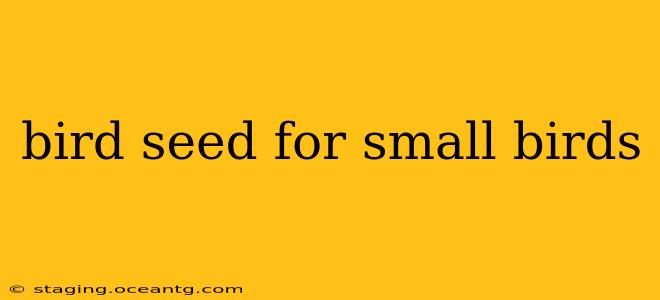Attracting small birds to your garden is a rewarding experience. The cheerful chirping and vibrant plumage bring joy and a touch of nature to your home. But choosing the right bird seed is crucial for ensuring these feathered friends thrive. This comprehensive guide will help you select the ideal blend for the tiny birds visiting your backyard, addressing common questions and offering expert advice.
What kind of bird seed do small birds like?
Small birds, such as finches, chickadees, wrens, and hummingbirds, have different dietary needs and preferences. While some enjoy a variety of seeds, others are more selective. Generally, smaller seeds are best suited for smaller birds. These include:
-
Nyjer (thistle) seed: A tiny, black oil-rich seed particularly favored by goldfinches and other smaller finches. It's high in energy and essential fatty acids.
-
Sunflower chips: Smaller pieces of sunflower seeds are easier for smaller birds to handle than whole seeds. They offer a good source of energy.
-
Millet: A small, round seed available in white, red, and yellow varieties. It's a popular choice for many small bird species, including sparrows and juncos.
-
Small-sized sunflower seeds: While whole sunflower seeds are popular with larger birds, smaller birds can manage smaller varieties.
What is the best bird seed mix for small birds?
There isn't one single "best" mix, as the ideal blend depends on the specific birds frequenting your feeders. However, a good mix for attracting a variety of small birds will typically include a combination of the seeds mentioned above. Look for mixes specifically labeled as "finch mix" or "small bird mix." These blends usually have a higher percentage of smaller seeds and less filler like cracked corn.
Avoid mixes with large amounts of filler, such as wheat or corn, as these are less appealing to smaller birds and can lead to wasted seed.
What bird seed should I avoid for small birds?
While some seeds are perfectly fine, others should be avoided or offered in moderation:
-
Cracked corn: While loved by larger birds, it's generally not favored by smaller birds and can become moldy easily.
-
Milo: Another grain primarily preferred by larger birds, it's not ideal for small birds' smaller beaks and dietary requirements.
What is the best way to feed small birds?
Providing the right type of feeder is as important as the seed itself. Small birds often prefer:
-
Tube feeders: These feeders have small perches and openings, preventing larger birds from accessing the seed.
-
Mesh feeders: Especially suitable for Nyjer seeds, they allow birds to easily access the seeds while keeping them clean and dry.
-
Suet feeders: While not a seed, suet provides a high-energy food source that is particularly beneficial during colder months.
What else can I feed small birds besides seed?
In addition to seed, you can also supplement your small bird's diet with:
-
Suet: As mentioned above, suet offers a high-energy boost, especially during winter.
-
Fruit: Apples, oranges, and berries provide valuable vitamins and minerals.
-
Mealworms: Live or dried mealworms are an excellent source of protein, particularly beneficial for nesting birds and growing chicks.
-
Nectar: If you have hummingbirds, ensure you offer a hummingbird feeder filled with a sugar-water solution (make sure to use plain white sugar and avoid red dye).
By understanding the preferences of small birds and choosing the right seed and feeders, you can create a vibrant and thriving bird-friendly haven in your backyard. Remember to keep feeders clean and regularly replenish the seed to keep your feathered friends happy and healthy.
